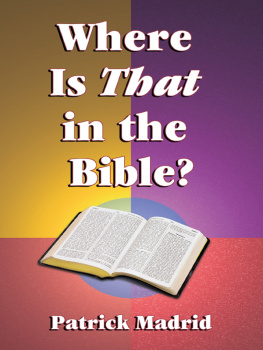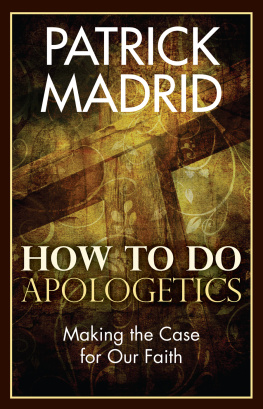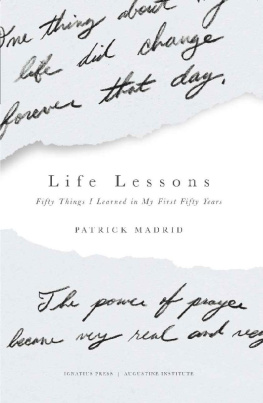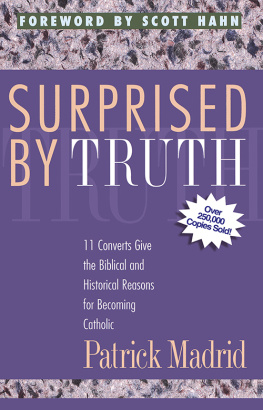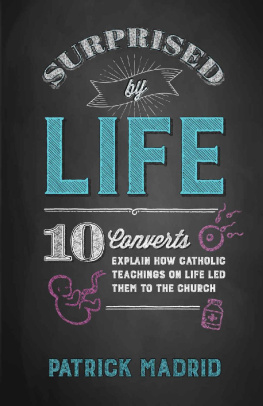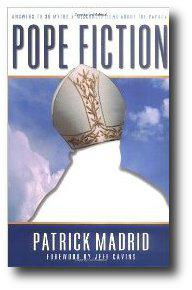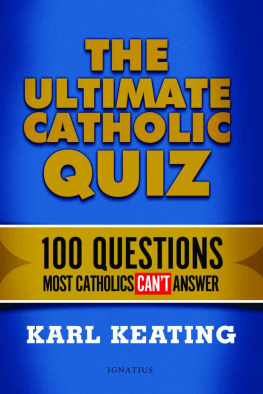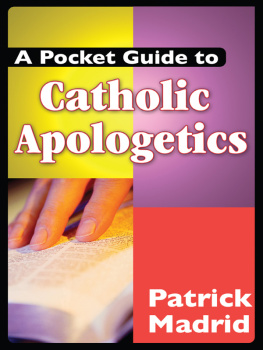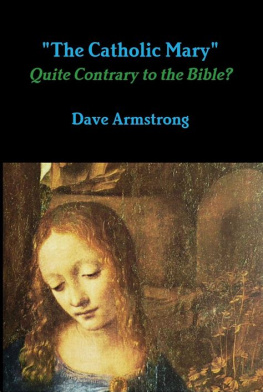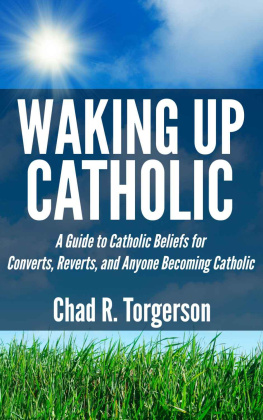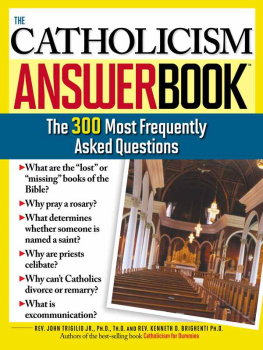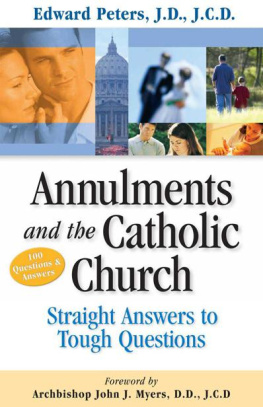Answer
Me
This!
Answer
Me
This!
Patrick Madrid
Our Sunday Visitor Publishing Division
Our Sunday Visitor, Inc.
Huntington, Indiana 46750
Unless otherwise noted, Scripture citations used in this work are taken from the Catholic Edition of the Revised Standard Version of the Bible (RSV), copyright 1965 and 1966 by the Division of Christian Education of the National Council of the Churches of Christ in the United States of America.
Used by permission. All rights reserved.
Every reasonable effort has been made to determine copyright holders of excerpted materials and to secure permissions as needed. If any copyrighted materials have been inadvertently used in this work without proper credit being given in one form or another, please notify Our Sunday Visitor in writing so that future printings of this work may be corrected accordingly.
Copyright 2003 by Patrick Madrid
All rights reserved. With the exception of short excerpts for critical reviews, no part of this work may be reproduced or transmitted in any form or by any means whatsoever without permission in writing from the publisher. Write:
Our Sunday Visitor Publishing Division
Our Sunday Visitor, Inc.
200 Noll Plaza
Huntington, IN 46750
ISBN: 978-1-931709-58-3 (Inventory No. T35)
LCCN: 2003110881
Cover design by Tyler Ottinger
Interior design by Sherri L. Hoffman
PRINTED IN THE UNITED STATES OF AMERICA
__________________
To Sister Judith Zuiga, O.C.D., my dear friend and sister in Christ, with fraternal affection and tres cosas.
God does not deign to save his people by means of dialectics. The kingdom of God is in the simplicity of faith, not in contentious words.
St. Ambrose of Milan
Exposition of the Christian Faith
(Book I, chapter 5)
CONTENTS
INTRODUCTION
An Apologist Does Not Apologize
I am a Catholic apologist, which means I do my best to provide factual, convincing answers to peoples questions about Catholicism. This book of Catholic apologetics is designed to show you how to do the same thing: to answer, calmly, charitably, and effectively, many of the tough questions people these days level at Catholics.
Just to clarify, an apologist is not someone who goes around apologizing for being Catholic, as if to express regret for this or that aspect of the Catholic religion. In modern usage, the ancient word apology (Greek and Latin: apologia) has come to mean an expression of dismay or regret for something we wish hadnt happened. But originally, the meaning was exactly the opposite. An apologist is someone who offers a reasoned defense for Christianity, usually using three tools: Scripture, the facts of Christian history, and logic. Apologetics, therefore, is the activity of presenting that defense.
The title of this book Answer Me This! points us to the heart of a particular challenge the Catholic Church has faced in each of the last twenty centuries (future centuries will be no different). There are many competing ideologies, religions, movements, and isms out there, and all of them, in one way or another, raise questions, objections, and challenges to the True Faith.
To hear someone say, Answer me this! about some aspect of the Catholic Church and its teachings requires a choice on your part. Either you can ignore the question and walk away leaving it unanswered, or you can respond the way St. Peter exhorts us to in situations like this:
Always be prepared to make a defense to any one who calls you to account for the hope that is in you, yet do it with gentleness and reverence. (1 Peter 3:15)
To make a defense, as St. Peter puts it, is precisely what apologetics is all about. It doesnt mean being defensive or argumentative. Rather, it means giving reasons good, solid reasons, backed up by the evidence of Scripture, Christian history, and common sense when questions arise, as they inevitably will. And this is nothing new in the life of the Church.
Defending the Faith A Primer
Apologists and apologetics have been active in the life of the Catholic Church all the way back to the time of the early Christians. St. Paul was certainly one of the greatest apologists the Church has ever known. His New Testament writings in defense of Christianity against the criticisms and arguments raised by his fellow Jews, form a major portion of ancient Catholic apologetics.
In subsequent generations, the mission of the Church was assisted and fortified by apologist saints such as Justin Martyr, Irenaeus of Lyons, Athanasius, Cyprian of Carthage, Ambrose of Milan, Augustine, Jerome, and Cyril of Jerusalem, just to name a few. These and many other early Catholics came to the defense of the Catholic Church during times of controversy and persecution. Their efforts to explain and defend Catholic teaching paved the way for future generations, including our own, to safely navigate the waters of societal upheaval, theological uncertainty, persecution, and doctrinal controversies.
Later generations saw formidable apologists emerge in times of crisis and upheaval. The Middle Ages saw the rise of such giants as St. John Damascene, and later St. Bernard of Clairvaux and St. Thomas Aquinas took on the challenges of their day, dispatching objections with clarity and charity, showing from Scripture and history the truth of Catholic teaching. These men, in turn, were followed by successive waves of apologists who drew on the wide and deep reservoir of apologetics created by their forerunners.
When the Protestant Reformation began to gain traction in Europe, Catholic apologists entered the fray: St. Robert Bellarmine, St. Edmund Campion, St. Peter Canisius, and others, who engaged and refuted the Protestant theologians with a rigorous knowledge of the Bible and the writings of the early Church Fathers.
St. Ignatius of Loyola founded the Society of Jesus, known commonly as the Jesuits, to act as a coordinated cadre of shock troops who would stand up for Christ and the Church in locations where either or both were under attack. In the five centuries since Martin Luther ignited the conflagration of division and theological anarchy within Christendom, Catholic apologetics has played a vital role in the communal life of the Church and in the lives of individual Christians.
Modern Challenges to the Faith
Today, apologetics is enjoying a strong and rapid revival after decades of being considered pass and, oddly, pre-Vatican II. Its odd, because those who claim that apologetics (i.e., defending the Faith) belies an unacceptable pre-Vatican-II retrograde mentality, seem to have not read the documents of the Second Vatican Council very carefully.
In several places, the Council exhorts Catholics, lay people in particular, to be ready and willing to defend the truths of the Catholic Faith. For example:
Since, in our own times, new problems are arising and very serious errors are circulating which tend to undermine the foundations of religion, the moral order, and human society itself, this sacred synod earnestly exhorts laymen each according to his own gifts of intelligence and learning to be more diligent in doing what they can to explain, defend, and properly apply Christian principles to the problems of our era in accordance with the mind of the Church.
It is quite unbecoming for the Churchs children idly to permit the message of salvation to be thwarted or impeded. Therefore, this sacred Synod advises them of the obligation they have to maintain and assist Catholic newspapers, periodicals and film projects, radio and television programs and stations, whose principal objective is to spread and defend the truth and foster Christian influence in human society.
There are now, more than ever, many distinct challenges to Christ and His Church. Many voices clamor for our attention and belief. Not only are there literally thousands of Protestant denominations today, each of which ardently proclaims that it has the truth, taken straight from the Bible; there are innumerable quasi-Christian and non-Christian groups working hard to gain converts. Mormons, Jehovahs Witnesses, Seventh-Day Adventists, and Moonies, are out there in force proselytizing on the airwaves, through magazines and television commercials and, of course, through the time-tested method of going door-to-door in search of new members. No doubt, you yourself have been visited at your home at least once by a pair of smiling missionaries from the local church of (insert the name of the group here). They want to leave you their literature, start a Bible study with you in your home, or in some other way get you to abandon your Catholic Faith and embrace theirs.
Next page

